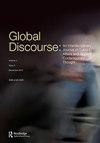Chronic crisis and nuclear disaster humanitarianism: recuperation of Chernobyl and Fukushima children in Italy
IF 1.4
Q2 INTERNATIONAL RELATIONS
引用次数: 1
Abstract
This article situates Henrik Vigh’s concept of ‘chronic crisis’ in social disaster research and humanitarian studies in order to explore how child survivors experience and address the prolonged consequences of disasters. The rationale for mobilising the concept of chronic crisis is that it opens up possibilities for exploring the dynamics and multidimensionality of disasters and humanitarian responses to them. Using the example of nuclear disasters, the article looks at the enduring humanitarian initiatives of Italian non-governmental organisations in recuperating Chernobyl and Fukushima children in Italy. It focuses on the opportunities, challenges and outcomes of these recuperative programmes, and underscores the non-linearity of survivor agency. The article argues that chronic crisis in nuclear disasters can simultaneously contribute to deterioration and ruination of survivors’ lives, catharsis, and hope. It is further argued that humanitarianism can shape chronic crisis either by exacerbating the alreadyprecarious conditions of human existence (through social discrimination and prejudice), or by alleviating survivor suffering (through social and cultural support).Key messagesChronic crisis is a way to understand humanitarian disasters beyond chronic emergency and protracted crisis.Chronic crisis occupies an ambiguous space between normalcy and emergency.Nuclear disaster humanitarianism is a practice of a simultaneous healing from and reinforcement of chronic crisis.Nuclear disaster humanitarianism can alleviate chronic crisis for some but reinforce it for others.慢性危机和核灾难人道主义:意大利切尔诺贝利和福岛儿童的康复
本文将亨里克·维(Henrik Vigh)的“慢性危机”概念置于社会灾难研究和人道主义研究中,以探讨儿童幸存者如何经历和应对灾难的长期后果。动员长期危机概念的基本原理是,它为探索灾害的动态和多维性以及对灾害的人道主义反应提供了可能性。文章以核灾难为例,考察了意大利非政府组织在救助切尔诺贝利和福岛儿童方面所采取的持久的人道主义行动。它侧重于这些康复方案的机遇、挑战和结果,并强调幸存者机构的非线性。这篇文章认为,核灾难中的长期危机可能同时导致幸存者生活、宣泄和希望的恶化和毁灭。有人进一步认为,人道主义可以通过(通过社会歧视和偏见)加剧已经岌岌可危的人类生存条件,或者通过(通过社会和文化支持)减轻幸存者的痛苦,从而形成长期危机。关键信息长期危机是超越长期紧急情况和长期危机来理解人道主义灾难的一种方式。长期危机在正常和紧急之间占据着一个模糊的空间。核灾难人道主义是一种同时治愈和加强长期危机的做法。核灾难人道主义对一些人来说可以缓解长期危机,但对另一些人来说却加剧了危机。
本文章由计算机程序翻译,如有差异,请以英文原文为准。
求助全文
约1分钟内获得全文
求助全文
来源期刊

Global Discourse
Social Sciences-Political Science and International Relations
CiteScore
4.10
自引率
6.70%
发文量
64
期刊介绍:
Global Discourse is an interdisciplinary, problem-oriented journal of applied contemporary thought operating at the intersection of politics, international relations, sociology and social policy. The journal’s scope is broad, encouraging interrogation of current affairs with regard to core questions of distributive justice, wellbeing, cultural diversity, autonomy, sovereignty, security and recognition. All issues are themed and aimed at addressing pressing issues as they emerge.
 求助内容:
求助内容: 应助结果提醒方式:
应助结果提醒方式:


